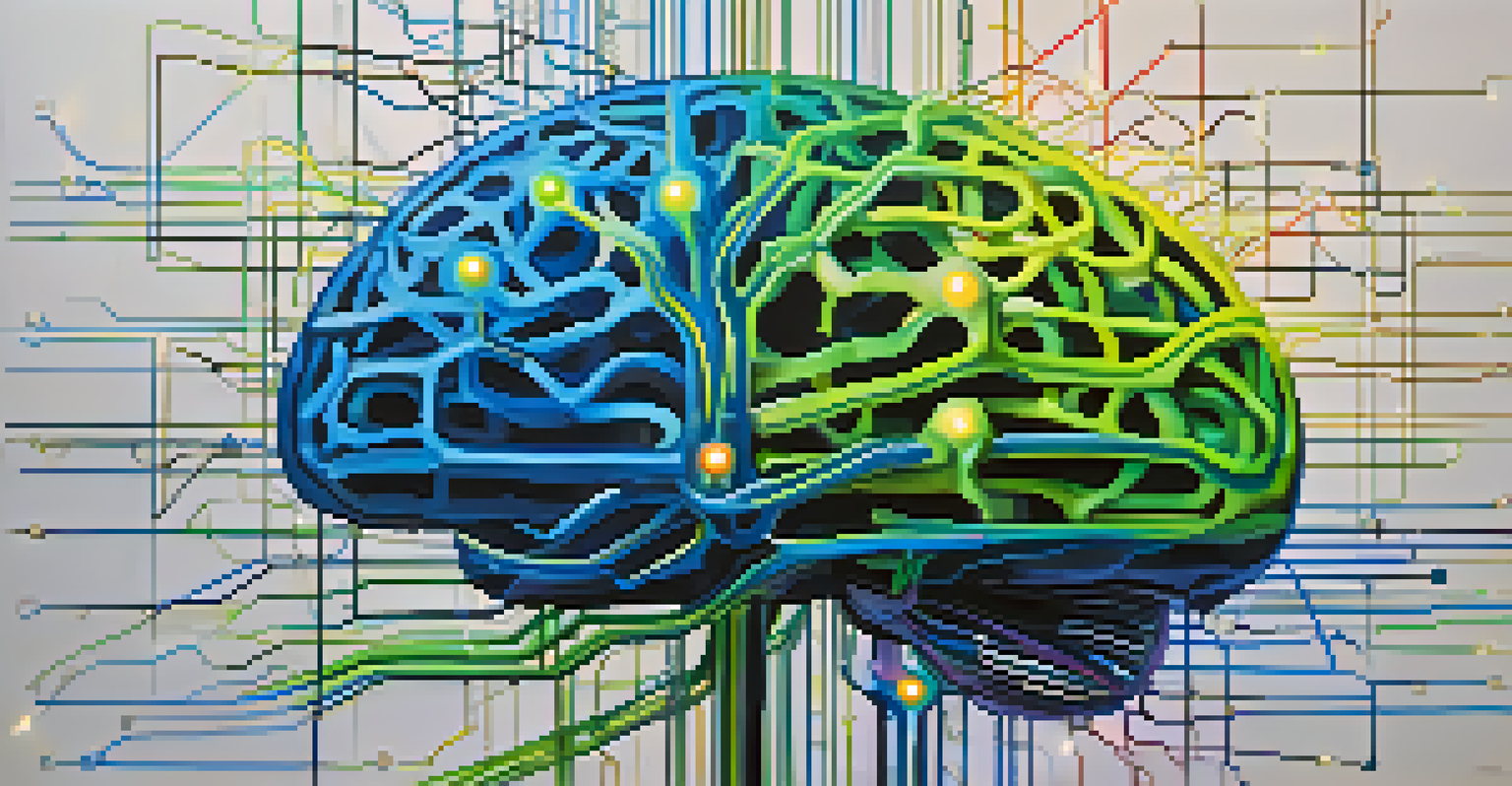Dopamine and Hallucinogens: Implications for Neuroendocrine Health

Understanding Dopamine: The Brain's Reward Chemical
Dopamine is often referred to as the brain's 'feel-good' neurotransmitter. It plays a crucial role in our motivation, mood, and even movement. When we engage in activities that bring us joy, like eating our favorite meal or receiving praise, dopamine is released, creating feelings of pleasure and satisfaction.
The mind is everything. What you think you become.
This neurotransmitter is also essential for learning and reinforcing behaviors, as it encourages us to repeat activities that yield positive outcomes. Imagine it as a reward system within your brain, nudging you toward actions that promote well-being. However, the balance of dopamine levels is vital for optimal functioning.
Too much or too little dopamine can lead to various psychological or physical issues. For instance, excess dopamine is often linked to conditions like schizophrenia, while insufficient levels are associated with Parkinson's disease. Understanding dopamine is fundamental when we explore its interaction with hallucinogens.
Hallucinogens: A Brief Overview
Hallucinogens are a class of drugs that significantly alter perception, mood, and cognitive processes. Common examples include substances like LSD, psilocybin (magic mushrooms), and mescaline. These substances can induce vivid visual and auditory hallucinations, leading to profound changes in the user's consciousness.

Interestingly, hallucinogens affect neurotransmitter systems, particularly serotonin, but their impact on dopamine is also noteworthy. This dual action can lead to unique experiences—imagine stepping into a vibrant painting where colors and shapes dance around you, altering your perception of reality.
Dopamine: Key to Motivation and Mood
Dopamine plays a vital role in our motivation and mood, reinforcing behaviors that lead to pleasure and satisfaction.
While many people seek hallucinogens for therapeutic purposes or spiritual experiences, understanding their effects on brain chemistry is crucial for assessing their safety and potential benefits. The relationship between hallucinogens and dopamine opens a fascinating discussion about neuroendocrine health.
The Interaction of Dopamine and Hallucinogens
Research indicates that hallucinogens can influence dopamine release, which may contribute to their psychedelic effects. When these substances interact with dopamine pathways, they can enhance feelings of euphoria or lead to altered states of consciousness. Think of it as tuning a guitar; the right adjustments can create beautiful music, but the wrong ones can lead to discord.
The greatest discovery of my generation is that a human being can alter his life by altering his attitudes.
This interaction may also explain why some users report heightened emotional experiences while under the influence of hallucinogens. Increased dopamine levels can amplify feelings of joy, connectedness, or even anxiety, depending on the individual's mental state and environment.
However, it's essential to recognize that this relationship is complex and varies from person to person. Not everyone will experience the same effects, highlighting the need for more research to understand how these substances might be used safely and effectively in therapeutic contexts.
Neuroendocrine Health: What You Need to Know
Neuroendocrine health refers to the interplay between the nervous system and the endocrine system, which produces hormones regulating various body functions. This connection is vital for maintaining balance in our bodies, influencing everything from stress responses to growth and metabolism.
Dopamine plays a significant role in this system, affecting hormones like cortisol and adrenaline that are critical during stress. When hallucinogens alter dopamine levels, they can indirectly impact neuroendocrine function, which may lead to both therapeutic benefits and risks.
Hallucinogens Affect Brain Chemistry
Hallucinogens alter perception by influencing neurotransmitter systems, particularly dopamine and serotonin.
For instance, while some studies suggest hallucinogens might help reduce stress and anxiety by modulating dopamine, others warn of potential adverse effects on hormonal balance. Understanding these dynamics is essential for anyone considering the use of hallucinogens.
Potential Therapeutic Benefits of Hallucinogens
Recent studies have shown that hallucinogens may offer therapeutic benefits for certain mental health conditions, such as depression and PTSD. By influencing dopamine and serotonin pathways, these substances can promote emotional breakthroughs and help individuals process trauma. It's like clearing a foggy window—once the view is clearer, healing can begin.
The potential for these substances to induce lasting changes in mood and perspective has sparked increased interest in their clinical applications. For example, microdosing—taking sub-perceptual amounts of hallucinogens—has been explored as a way to enhance creativity and emotional well-being without the intense effects of a full dose.
However, it's crucial to approach these findings with caution. While the potential is promising, more research is necessary to understand the long-term implications and ensure safe usage. A thorough understanding of the neuroendocrine effects is essential for responsible exploration.
Risks and Considerations When Using Hallucinogens
While the therapeutic potential of hallucinogens is exciting, there are also significant risks to consider. These substances can induce anxiety, paranoia, or even psychosis in some individuals, particularly those with a history of mental health issues. It's essential to recognize that not everyone will have a positive experience, and factors like set and setting can greatly influence outcomes.
Moreover, the interaction between hallucinogens and dopamine may lead to unpredictable results, especially in individuals with pre-existing conditions. For instance, someone with a dopamine-related disorder could experience exacerbated symptoms, highlighting the importance of approaching use with caution and under professional guidance.
Therapeutic Potential and Risks
While hallucinogens may offer therapeutic benefits for mental health, they also carry significant risks that must be carefully considered.
Ultimately, the key is to balance exploration with awareness. Understanding the risks involved, along with the potential benefits, allows individuals to make informed decisions about their mental health and neuroendocrine well-being.
The Future of Research on Dopamine and Hallucinogens
As interest in the therapeutic applications of hallucinogens grows, so does the need for rigorous research. Studies examining how these substances interact with dopamine and affect neuroendocrine health are crucial for developing safe and effective treatment protocols. Think of it as embarking on a scientific journey; the more we explore, the clearer the path to understanding becomes.
Emerging research is already shedding light on the potential benefits and risks associated with hallucinogens. By using advanced neuroimaging techniques, scientists can observe how these substances affect brain activity, particularly in relation to dopamine pathways. This knowledge will be key in unlocking their therapeutic potential.

In conclusion, the relationship between dopamine, hallucinogens, and neuroendocrine health is a promising yet complex field. As we continue to explore these connections, we may uncover new avenues for treatment that could significantly improve mental health outcomes.